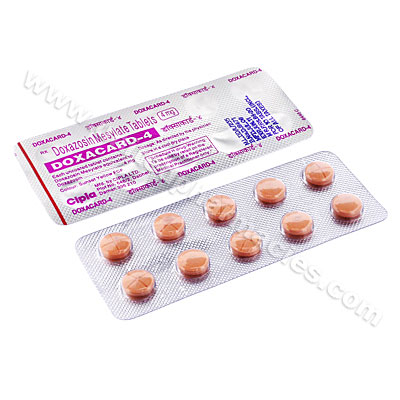Customers also like
Terapress (Terazosin) - 1mg (7 Tablets)
our best price : $3.79
Urimax (Tamsulosin HCL) - 0.4mg (30 Capsules)
our best price : $12.22
Alfusin (Alfuzosin HCL) - 10mg (15 Tablets)
our best price : $8.18
Description
Doxacard (Doxazosin) is used in the treatment of benign prostatic hyperplasia, a condition in which the prostate gland grows larger, pressing on the urethra and threatening to block the flow of urine from the bladder. The drug relieves symptoms such as a weak stream, dribbling, incomplete emptying of the bladder, frequent urination, and burning during urination.
This medicine is also used in the treatment of high blood pressure. It is effective when used alone or in combination with other blood pressure medications, such as diuretics, beta-blocking medications, calcium channel blockers or ACE inhibitors. Physicians also prescribe Doxacard (Doxazosin), along with other drugs such as digitalis and diuretics, for treatment of congestive heart failure.
Doxacard (Doxazosin) can be taken with or without food. Doxacard (Doxazosin) should be taken exactly as prescribed, even if your symptoms have disappeared. Try not to miss any doses. If this medication is not taken regularly, your condition may worsen. If you have benign prostatic hyperplasia, you should see improvement in a week. Blood pressure will fall in 2 to 6 hours.
Adults: Your physician will adjust the dosage to fit your needs. The usual starting dose is 1 milligram taken once a day. To minimize the potential for dizziness or fainting associated with Doxacard (Doxazosin), which may occur between 2 and 6 hours after a dose, your physician will monitor your blood pressure during this period and afterwards. After the effects of the starting dose are measured, your physician may increase the daily dose to 2 milligrams and then, if necessary, to 4 milligrams, 8 milligrams, or, in people with high blood pressure only, up to 16 milligrams. As the dose increases, the potential for side effects such as dizziness, vertigo, light-headedness, and fainting also increases.
Side effects cannot be anticipated. If any develop or change in intensity, inform your physician as soon as possible. Only your physician can determine if it is safe for you to continue taking Doxacard (Doxazosin).
More common side effects may include: dizziness, drowsiness, fatigue, headache.
Less common side effects may include: Abdominal pain, abnormal vision, arthritis, constipation, depression, diarrhea, difficulty sleeping, dry mouth, eye pain, fluid retention, flu-like symptoms, flushing, gas, increased sweating, inability to hold urine or other urination problems, indigestion, inflammation of conjunctiva (pinkeye), itching, flushes, joint pain, lack of muscle coordination, low blood pressure, motion disorders, muscle cramps, muscle pain, muscle weakness, nasal stuffiness, nausea, nervousness, nosebleeds, pain, rash, ringing in ears, shortness of breath, thirst, tingling or pins and needles, weakness.
Rare side effects may include: Abnormal thinking, agitation, allergic reactions, altered sense of smell, amnesia, blood in the urine, breast development in men, breast pain, breathing difficulties, changeable emotions, changes in taste, chest pain, confusion, coughing, decreased sensation, dizziness when standing up, dry skin, earache, fainting, fecal incontinence, fever, frequent urination, gout, hair loss, heart attack, hives, inability to concentrate, inability to tolerate light, increased appetite, increased thirst, infection, loss of appetite, loss of sense of personal identity, migraine headache, morbid dreams, nighttime urination, pallor, prolonged erections, rapid pounding heartbeat, sexual problems, sinus inflammation, slight or partial paralysis, slow heartbeat, sore throat, stroke, tremors, twitching, urinary disorders, vomiting, weight gain, weight loss, wheezing, yellow skin and eyes.
Doxacard (Doxazosin) can cause low blood pressure, especially when you first start taking the medication and when dosage is increased. This can cause you to become faint, dizzy, or light-headed, particularly when first standing up. You should avoid driving or any hazardous tasks where injury could occur for 24 hours after taking the first dose, after your dose has been increased, or if Doxacard (Doxazosin) has been stopped and then restarted.
In rare cases, men taking drugs such as Doxacard (Doxazosin) have developed priapism, a painful, long-lasting erection that persists for hours. This condition can lead to impotence, so if it occurs contact your physician right away.
If you have liver disease or are taking other medications that alter liver function, your physician will monitor you closely when you take Doxacard (Doxazosin).
Doxacard (Doxazosin) may lower blood counts. Your physician will most likely monitor your blood counts while you are taking this medication.














